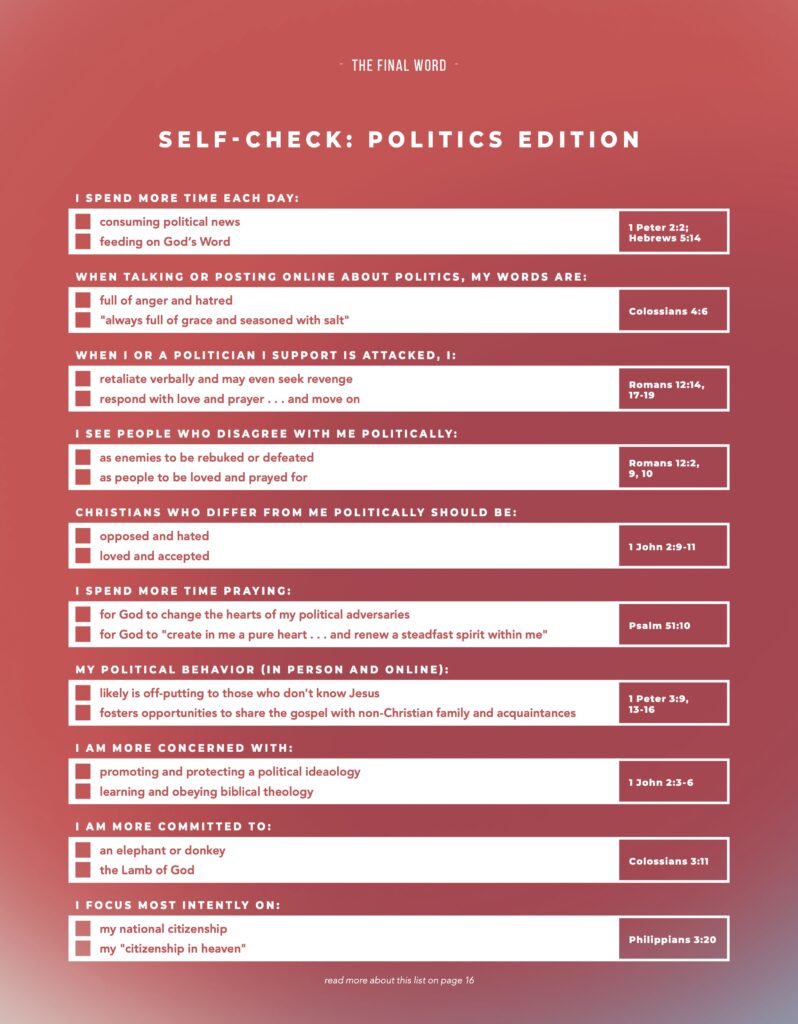By Kent E. Fillinger
The votes of white evangelicals impacted the last presidential election in a measurable way. A Lifeway Research study determined 4 of 5 such voters (80 percent) cast their ballots for Donald Trump in 2016.
But it’s wise to understand that “evangelicals” are not a homogenous group.
The same LifeWay study found that 4 of 5 black evangelicals (82 percent) voted for Hillary Clinton, while Hispanic evangelical voters were evenly split—47 percent Clinton, 48 percent Trump.
Looked at a different way, 48 percent of evangelicals by belief say they are Republicans, 31 percent are Democrats, and 21 percent say they’re independent or something else outside of the two major political parties (see “Heading into 2020 Elections, Most Evangelicals Want to Play Nice in Politics,” by Aaron Earls; lifewayresearch.com).
Given the diversity of thought about politics among evangelicals, I’d like to share some relevant statistics about how people view evangelicals and the church with regard to life and politics. This diversity often creates division between Christians and non-Christians, and even discord within Christianity.
Statistics to Note
According to Gallup surveys from 2018 and 2019, the percentage of people who have “a great deal” or “quite a lot” of confidence in the church and organized religion has dipped to an all-time low, 36 percent. This is a significant shift from 1973-1985 when confidence in the church was tops among all institutions; during those years, high confidence in church and organized religion ranged from 62 percent to 68 percent (see “U.S. Confidence in Organized Religion Remains Low,” by Justin McCarthy; news.gallup.com).
Men and young adults (18 to 34 years old) are more likely than women and various other age groups, respectively, to say they have very little or no confidence in the church or organized religion, the June 2019 Gallup survey showed. Almost half of Americans who are politically liberal (45 percent) say they have very little or no confidence in the church, compared with 27 percent of moderates and 15 percent of conservatives. Broken down by political party, 35 percent of Democrats, 32 percent of independents, and 16 percent of Republicans have very little or no confidence in the church or organized religion.
The three groups that expressed the least confidence in church—men, young adults, and non-Republicans—are not surprisingly among the groups least likely to attend church. Consider that in light of a Barna Group study from December 2019 that found 56 percent of pastors said “reaching a younger audience” was a top concern for the church in the United States.
A different LifeWay Research study found that among young adults who stayed in church upon reaching adulthood, 63 percent said they agreed with their church’s political perspective, while only 29 percent of those who dropped out of church said the same (see “Young Adults Keep Christian Label, Shed Many Practices,” by Aaron Earls; blog.lifeway.com).
“Neither conservative nor liberal politics keep young adults from church,” said Scott McConnell, executive director of LifeWay Research. “But when a church communicates political views that differ from a young adult, that person is much less likely to walk that church’s aisle.”
Pew Research found that 76 percent of Americans do not want churches to endorse specific candidates. Interestingly, 45 percent of U.S. adults who attend church services a few times a year or more say they’re not sure whether the ministers at their church are Democrats or Republicans (see “Many Churchgoers in U.S. Don’t Know the Political Leanings of Their Clergy,” by Claire Gecewicz; www.pewresearch.org).
And a LifeWay Research survey from 2015 found that 79 percent of Americans believe it’s inappropriate for pastors to publicly endorse candidates for public office during a church service.
“Our end goal as pastors is to grow deeper, more passionate, biblically informed, world-changing followers of Jesus. It isn’t to mobilize a political voting bloc,” Joel Rainey, lead pastor of Covenant Church in Shepherdstown, West Virginia, wrote earlier this year in Facts & Trends (factsandtrends.net). “Disciples aren’t strengthened and God’s kingdom isn’t advanced by taking over the power structures of this temporary world.”
A November 2019 Barna Group report showed that Americans increasingly view evangelicals through a political lens, which creates mixed feelings toward this group. The report showed that political ideology impacted people’s views of evangelicals. Those who identified as “mostly conservative” were significantly more likely to view evangelicals positively than those who identified as “mostly liberal.”
An article about that Barna report stated, “Non-Christians are predisposed to hold negative ideas about evangelicals, favoring adjectives like ‘narrow-minded’ (34 percent), ‘homophobic’ (30 percent), ‘misogynistic’ (21 percent), ‘racist’ (17 percent) and ‘uptight’ (20 percent).”
Almost half (47 percent) of non-Christians had some level of negative feelings toward evangelicals. “The findings strongly suggest that the perceptions of evangelicals are more barrier than bridge on the road to gaining a hearing for the gospel,” the article concluded. (See “U.S. Adults See Evangelicals Through a Political Lens”; www.barna.com.)
QUESTIONS TO CONSIDER
Paul encouraged us to “examine ourselves to see if our faith is genuine and to test ourselves” (2 Corinthians 13:5, author’s paraphrase). The apostle also advised, “Pay careful attention to our own work . . . for we are each responsible for our own conduct” (Galatians 6:4, author’s paraphrase).
With this counsel in mind, here are 10 questions for evaluating yourself during this political season:
- Do I spend more time each day consuming political news or feeding on God’s Word? (1 Peter 2:2; Hebrews 5:14)
- When speaking or posting online about politicians or people with whom I politically disagree, are my words full of anger and hatred or are they “always full of grace and seasoned with salt”? (Colossians 4:6)
- When attacked personally—or when a politician for whom I voted is attacked—do I retaliate verbally and seek revenge, or do I respond with love and prayer . . . and move on? (Romans 12:14, 17-19)
- Do I see people who disagree with me politically as enemies to be rebuked and defeated or as people to be loved and prayed for? (Romans 12:2, 9, 10)
- Do I hate and oppose other Christians who vote for a different political party than me, or do I love and accept them? (1 John 2:9-11)
- How much time do I spend praying for God to change the hearts of my political adversaries rather than asking God to “create in me a pure heart . . . and renew a steadfast spirit within me”? (Psalm 51:10)
- Is my behavior, as it relates to politics—both in person or online—more likely to build a barrier or a bridge to sharing the gospel with my non-Christian family members, neighbors, and coworkers? (1 Peter 3:9, 13-16)
- Am I more concerned about promoting and protecting a political ideology than in learning and obeying biblical theology? (1 John 2:3-6)
- To whom am I most committed—an elephant, a donkey, or the Lamb of God? (Colossians 3:11)
- Which is more important to me—American citizenship or my “citizenship in heaven”? (Philippians 3:20)
Kent E. Fillinger serves as president of 3:STRANDS Consulting, Indianapolis, Indiana, and regional vice president (Ohio, Pennsylvania, Michigan) with Christian Financial Resources.



0 Comments